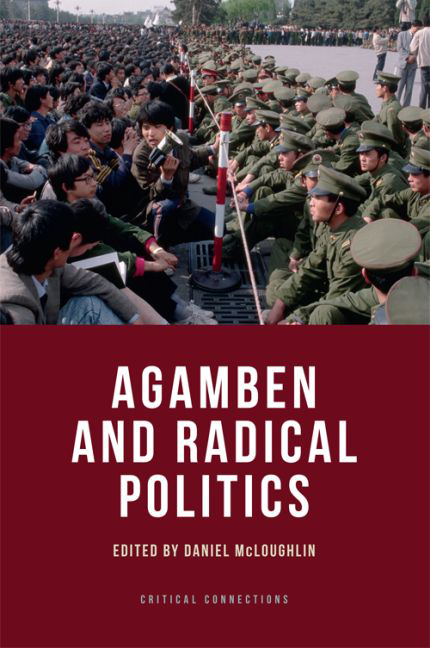Book contents
- Frontmatter
- Contents
- Acknowledgements
- Introduction: Agamben and Radical Politics
- 1 Capitalism as Religion
- 2 Glory, Spectacle and Inoperativity: Agamben's Praxis of Theoria
- 3 On Property and the Philosophy of Poverty: Agamben and Anarchism
- 4 ‘Man Produces Universally’: Praxis and Production in Agamben and Marx
- 5 Liturgical Labour: Agamben on the Post-Fordist Spectacle
- 6 An Alogical Space of Genetic Reintrication: Notes on an Element of Giorgio Agamben's Method
- 7 Zoē aiōniōs: Giorgio Agamben and the Critique of Katechontic Time
- 8 Agamben, Badiou and Affirmative Biopolitics
- 9 Form-of-Life and Antagonism: On Homo Sacer and Operaismo
- 10 What Is a Form-of-Life?: Giorgio Agamben and the Practice of Poverty
- 11 Law and Life beyond Incorporation: Agamben, Highest Poverty and the Papal Legal Revolution
- Notes on Contributors
- Index
10 - What Is a Form-of-Life?: Giorgio Agamben and the Practice of Poverty
Published online by Cambridge University Press: 23 September 2017
- Frontmatter
- Contents
- Acknowledgements
- Introduction: Agamben and Radical Politics
- 1 Capitalism as Religion
- 2 Glory, Spectacle and Inoperativity: Agamben's Praxis of Theoria
- 3 On Property and the Philosophy of Poverty: Agamben and Anarchism
- 4 ‘Man Produces Universally’: Praxis and Production in Agamben and Marx
- 5 Liturgical Labour: Agamben on the Post-Fordist Spectacle
- 6 An Alogical Space of Genetic Reintrication: Notes on an Element of Giorgio Agamben's Method
- 7 Zoē aiōniōs: Giorgio Agamben and the Critique of Katechontic Time
- 8 Agamben, Badiou and Affirmative Biopolitics
- 9 Form-of-Life and Antagonism: On Homo Sacer and Operaismo
- 10 What Is a Form-of-Life?: Giorgio Agamben and the Practice of Poverty
- 11 Law and Life beyond Incorporation: Agamben, Highest Poverty and the Papal Legal Revolution
- Notes on Contributors
- Index
Summary
What is your aim in philosophy?
To show the fly the way out of the fly-bottle.
Ludwig Wittgenstein, Philosophical Investigations, I, 309What I would like to attempt in this chapter, which at first might seem a simple matter, is to determine the meaning of what Giorgio Agamben calls a ‘form-of-life’ and to make clear how its technical sense differs from the term ‘form of life’, which bears a slightly different inscription, and in relation to which form-oflife remains in continual tension. Although both terms have been part of Agamben's lexicon for over two decades, the manner in which they have been discussed in the secondary literature remains unconvincing – in part because these considerations are often limited to simple repetitions of Agamben's sparse formulation. But this is not entirely the fault of Agamben's readership. There is a great deal of ambiguity, if not outright inconsistency, in the manner in which Agamben deploys the terms and, until quite recently, their presentation has been, somewhat notoriously, uncertain.
In order to comprehend the strategic function these terms play in Agamben's thought we must, however, approach them obliquely because it is not possible to adequately understand what is meant by form-of-life unless we first come to terms with the role that the concept of necessity plays in Agamben's analysis of juridical power. As will become clear in what follows, Agamben's investigation into the limits of legal authority is guided by his treatment of necessity, a concept that plays a central role in two pivotal texts, State of Exception and The Highest Poverty, which, despite their evident differences, in fact mirror each other quite closely. Since it is within the pages of the more recent of these two books, The Highest Poverty, that Agamben provides his fullest treatment to date of the positive content of form-of-life – an undertaking announced in the book's subtitle – it will serve as the focus of this study.
Two necessities
The Greeks gave the name Ananke to the personification of necessity and in Orphic theology she appears as the wife of Demiurgus and as the mother of both the Moerae (the fates) and Heimarmenē (destiny).
- Type
- Chapter
- Information
- Agamben and Radical Politics , pp. 207 - 233Publisher: Edinburgh University PressPrint publication year: 2016



